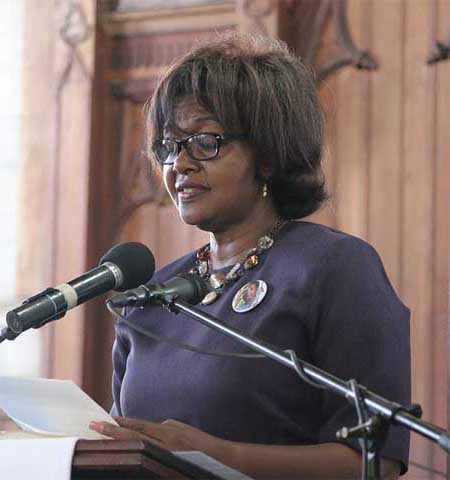Though the Guyana Court of Appeal had said on Sunday that consequential orders would have been issued yesterday following a ruling that cleared the way for the Guyana Elections Commission (GECOM) to proceed with a recount of the ballots cast in the March 2nd general and regional elections, those orders are now expected today.
Attorneys in the case confirmed to Stabroek News that the court has indicated to them via e-mail that the orders will be made available today.
No reason was given for the change.
In a two-to-one decision, the Appeal Court on Sunday allowed a sliver of APNU+AFC candidate Ulita Moore’s appeal and ruled that GECOM has the authority to do a recount of ballots but cannot accord this power to any other body as appeared to have been suggested in a GECOM press release which said that a Caribbean Community (CARICOM) team would “supervise” the recount.
While Justice of Appeal Dawn Gregory and Justice Brassington Reynolds partially allowed Moore’s appeal, Justice Rishi Persaud ruled against and instead fully agreed with the Full Court’s decision that Justice Franklyn Holder had no jurisdiction to hear Moore’s matter.
In allowing the appeal on a slim basis on the issue of jurisdiction, Justice Gregory said the jurisdiction of the High Court is a narrow one and it was invoked by the description of the authority of the CARICOM team relative to the constitutional powers of GECOM.
She stressed that the court grants the order that any agreement in which supervision of the election is removed from GECOM and ascribed to anybody else, will be unlawful.
“She asks for that and I believe that she has to get that particular order. I am granting her that order… The matter will not go back [to the High Court],” Justice Gregory said.
In dismissing Moore’s appeal, Justice Persaud said having regard to all the circumstances of the case, including its national importance, he could not fault the judges – acting Chief Justice Roxane George-Wiltshire and Justice Nareshwar Harnanan – sitting in the Full Court, in exercising their discretion in the way in which they did.
The Full Court dismissed Moore’s case and discharged the injunctions on a finding that her matter ought to have come by way of an elections petition and not judicial review as it had been filed before Justice Holder.
For his part, Justice Reynolds noted that GECOM’s primary mission, set out in articles 62 and 162 of the Constitution, is to conduct the electoral process. He noted that the operational phases of the elections are detailed very minutely in provisions of the Representation of the People Act and are a virtual road map for the entire electoral process.
“…it is my respectful view that it will be remiss of the court to expect the appellant to await the outcome of an elections petition to redress this issue. It is my respectful opinion that this development having been brought to the attention of the court, while being actively concerned wholly outside of the scope of the commission’s constitutional remit, warranted the intervention of the court in its supervisory constitutional jurisdiction,” the judge said.
He said that the court, in its supervisory jurisdiction, is in a position to say to GECOM that it should not outsource its supervisory responsibility in terms that are outside the scope of its constitutional remit. For that reason, and others, which he said were more fully detailed in Justice Gregory’s judgment, he was in agreement with her findings and the order she makes.
Moore had applied to the High Court for judicial review by way of an application in which she contended that GECOM could not order a recount based on an Aide Memoire signed by President David Granger and Opposition Leader Bharrat Jagdeo.
President Granger had contacted CARICOM Chair, Prime Minister of Barbados Mia Mottley, and agreed for a recount to be done following controversy over the tabulation of the votes cast for Region Four, which opposition parties as well as international and many local observers say was not done in a transparent and credible manner.
Following the president’s request, Prime Minister Mottley had put together what she described as an independent high-level CARICOM team, which traveled to Guyana to supervise the recount. This was, however, aborted after Moore filed her application and was granted the injunction against the recount.
Justice Dawn Gregory ruled that the matter would not be remitted to Justice Franklyn Holder’s court since the Appeal Court had already examined the matter.
She said that not all the issues raised by Moore warranted an elections petition, while noting that the High Court could have invoked its supervisory powers to declare that the proposed recount ought to be supervised by GECOM and no other body.
She noted that the Full Court erred in this regard in not so declaring.
In the High Court, Justice Holder had granted Moore interim injunctions halting the recount process until her case would have been fully heard and determined.
However, the Opposition challenged this and the Full Court dismissed Moore’s case and discharged the injunctions on a finding that her matter ought to have come by way of an elections petition as opposed to an application for judicial review.
This was Jagdeo’s position regarding Moore’s case, which he argued Justice Holder had no jurisdiction to hear.









